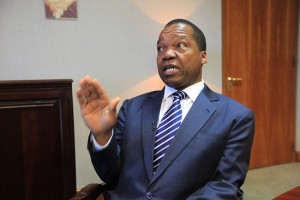
Mangudya
Some of the major highlights of the monetary policy statement include the de-dollarization of the economy through the introduction of local currency bank accounts which will be traded in electronic transfers and bond notes.
The move to de-dollarize the economy is in essence a late rude awakening on the part of the administration that the fiscal measures which were pursued since the introduction of the bond note, which was declared to be at par with the United States Dollar are unrealistic.
The monetary policy statement also exposed how unsustainable budget deficits, coming on the backdrop of unnecessary government expenditure; continue to widen domestic debt which has risen from 275.8 Million in 2012 to 9.5 Billion at a time external debt stands at $7.4 Billion.
Crisis in Zimbabwe Coalition (CiZC) is concerned that at a time Zimbabwe’s economy continues on a downward trend, with the ordinary citizens being at the receiving end of the debilitating effects, the government, through fiscal measures announced by the Finance Minister has moved to pile more taxes on the transacting public.
The move to hike electronic transactions tax is ill advised especially given Zimbabwe’s current economic status which has seen the majority living far below the Poverty Datum Line (PDL).
The government has in actual fact abrogated on its social protection role and has turned into a commercialized State in which the poor are left exposed while the rich are protected through the mechanisms introduced to ring fence the Foreign Currency Accounts.
After the monetary policy presentation, it has become quite clear that the poor people of Zimbabwe stand as the biggest victims of ill advised economic policies and there is great risk that the country will be forced into a multi-tier pricing system.
CiZC also takes with great exception, misleading sentiments from Dr Mangudya that the Zimbabwean economy is expanding ‘owing to increased business confidence within the national economy and positive expectations following the peaceful completion of the electoral process’.
Such sentiments are misleading and uncalled for especially coming from a public official. The reality on the ground is that Zimbabwe’s economy is on a continuous downward trend and this has been further exacerbated by the legitimacy crisis on the part of the current government following a highly disputed election.
Governor Mangudya needs not be reminded that addressing an economy implies confronting the real challenges at hand rather than mere politicking.
While presenting government’s fiscal measures, Finance Minister, Mthuli Ncube admitted that the economy was facing the following challenges; foreign currency and cash shortages, unsustainable high budget and current account deficits, emerging inflation pressures, slow moving re-engagement process, infrastructure deficiencies and weak social service delivery. He further highlighted that unsustainable high budget deficits were at the centre of these challenges.
As part of our response to the monetary policy and fiscal measures, we posit the following;
– That low productive capacity from the supply side of the economy, massive de-industrialization, informalization, low economic growth rates, unemployment, poverty, poor social services, poor revenue inflows, a ballooning debt coupled with corruption and abuse of national resources are at the nerve centre of the economic meltdown in Zimbabwe.
– Zimbabwe’s precarious economic state has been worsened by the professional decay of state institutions, failure to democratize the politics, breakdown of the rule of law, disregard of property rights, weak enforcement of thee constitutional Bill of Rights, poor political leadership characterized by the will to power rather than the will to transform (in this regard we reiterate that without a functioning constitutional democracy, sustainable economic development is not feasible)
Key recommendations
While we urge the government to strengthen its economic reform measures, as CiZC we are advocating for the following based on our alternative economic blueprint, the Zimbabwe Social Market Agenda for Recovery and Transformation (ZimSMART);
– Macro-economic stability that is pro-poor, inclusive and human centered with increased fiscal space, a high degree of competitiveness, a conducive environment for domestic and foreign investments, a strong export economy and high degrees of innovative capability with the State effectively playing its role in the economy by enhancing real sector performance, currency stability and ensuring the financial sector is stable. We further implore the government to put in place effective measures aimed at improving revenue generation in order to release funds into the productive sector.
CiZC further implores the government to adopt sustainable debt strategies, re-prioritize expenditure, restructuring state owned enterprises, implement sustainable taxation reforms, and promote domestic investment as well as to move with pace in re-engaging the international community (this of course is largely determined by the politics of the land).
– Revival of the productive sector with Small to Medium Enterprises being prioritized given their dominance in the economy. This calls for the government to do away with Iron and Fist policies, but through coordinating, facilitate and provide focused subsidies and start up finances to rejuvenate the sectors.
– A highly devolved, functional and modern infrastructure that forms the engine of economic growth. Rehabilitation of roads, rail, air, water and sanitation, energy and ICTs should be the government’s priority
– Creation of professional, transparent, accountable and globally competitive economic institutions
– Creation of a modern, equal, peaceful, open and pluralist society where everyone enjoys equal opportunities in life
CiZC would like to reiterate that in resolving the Zimbabwean crisis, there is need for a multi stakeholder dialogue aimed at coming up with economic solutions that are pro-poor.
Post published in: Business

